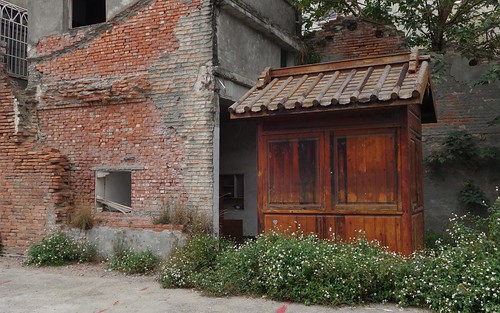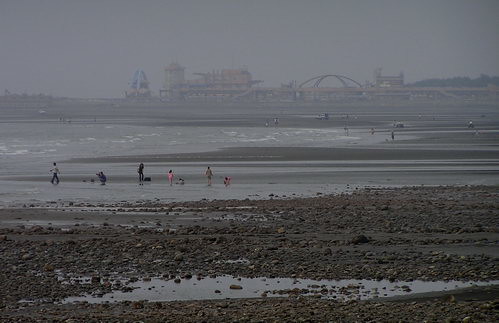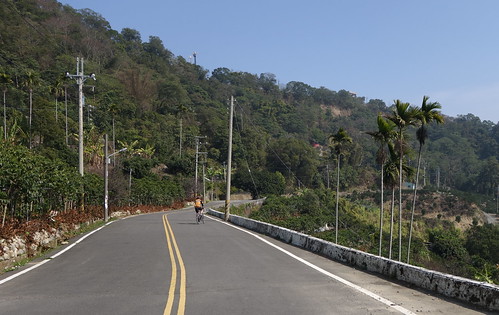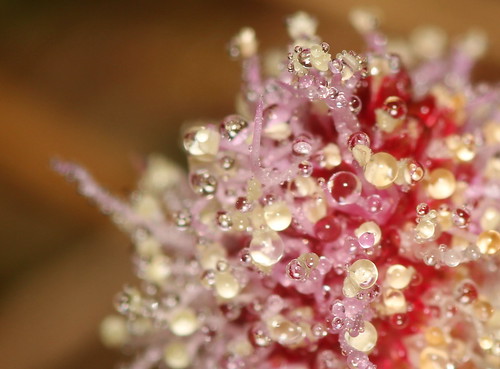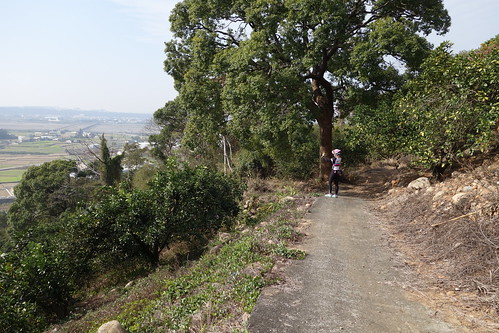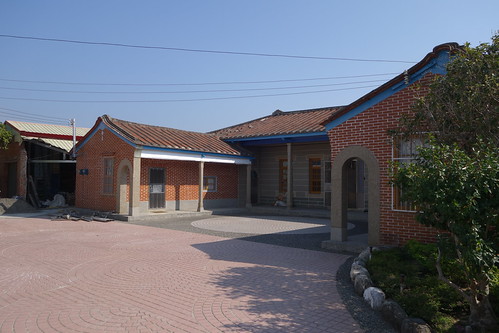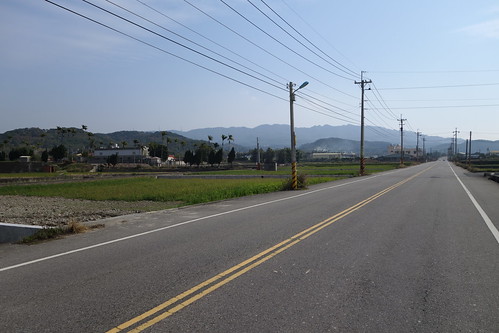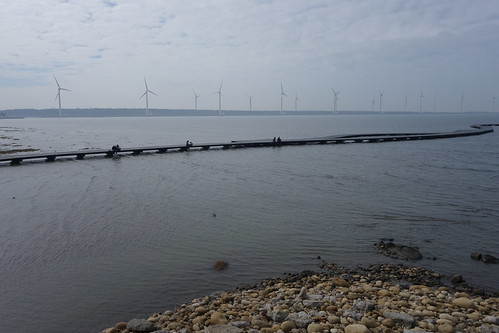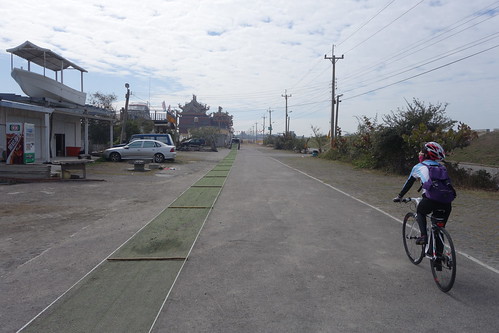Went out to Gaomei Wetlands today. Here my friend Eva flies past a long fishing net unrolled out of the back of a van in the distance.
President Chen Shui-bian, jailed on bribery charges, has been released on a one-month medical parole. This does not count against his prison time, and he will be returned to prison when his health improves. Everyone is in a tizzy....
Some are reading in the CSB release the consequences of the recent blowout election loss by the KMT, seeing it as the KMT fishing for votes in 2016. For example, see this
CS Monitor piece.
“It’s a good sign Ma Ying-jeou is willing to heal the political polarization,” says Wu Chung-li, research fellow at Taipei-based institute Academia Sinica. “I think this measure might increase his popularity in the near future." But Mr. Wu doubts the gesture will aid the Nationalists in the coming presidential campaign.
It is not a sign that Ma is willing to heal the polarization; that polarization is one of the things that keeps the KMT in power. Taiwan's partisan divide will be healed over the dead body of the KMT, when the KMT no longer has much influence, and the leadership knows that.
No, I think what this release signals is the waning power of Ma Ying-jeou. Some in the KMT know what I've been saying for years, that Chen Shui-bian dead in jail is a problem for the KMT, while Chen Shui-bian alive and shooting off his mouth is a problem for the DPP, and with Ma hobbled by brutal election loss and isolated in his own party, the brains finally prevailed over the urge to arbitrarily punish. Once again, I'd like to thank Ma Ying-jeou and the KMT for putting Chen in jail in an obviously politically-motivated trial, thus keeping him out of Tsai Ing-wen's hair for the last several years and turning him into a martyr for the Taiwan cause.
Does the Chen Shui-bian parole signal a more pragmatic and less ideologically-driven KMT than the one under the hopelessly ideological and unpragmatic Ma Ying-jeou (cue my laughter at international media for ever using the word
pragmatic to describe Ma)? The ascension of Eric Chu might augur that kind of possibility, if the Chen Shui-bian medical parole means anything. Dateline Taipei, the sometimes useful pro-KMT blog
translated an editorial from UDN, the rabidly pro-KMT newspaper, on the kind of reforms the incoming KMT Chairman Eric will need to achieve that... key points.
....The KMT has suffered a serious defeat. Yet no one inside the KMT is demanding an accounting...
One... One of the main shortcomings of the KMT's political culture, is its preoccupation with bickering over internal resources, its inability to recruit outside talent, and cultivate new talent. Over the long term, this has led to inbreeding and cliquishness. Ambitious and creative talents are marginalized and the party is hollowed out. Between 2009 and today, KMT membership fell from 50,000 to 35,000. The speed of the fall surpassed all expectations.
Let's reiterate: the elites at the heart of the KMT ran Taiwan by controlling patronage networks that showered development cash on local factions. In return for the cash, the KMT did not permit the local factions to operate at the national level or form cross-regional networks, thus preventing any challenges to its power. But this means that there is no system for bringing local politicians into the national party level and grooming them for top leadership positions, and even if there was, it would still be difficult, because local politics in Taiwan is notoriously dirty. The talent issue can't be resolved until the KMT cleans up its relationship with the local factions. Good luck with that. Ma Ying-jeou attempted an end run around the problem by appointing lots of academics to government positions. But that did not solve the issue within the party, because that "talent" didn't enter the KMT and participate in politics, with a few exceptions like Jiang Yi-hwa, and because it still didn't institute a mechanism for connecting the national party with promising local politicians.
Two. Consider the matter of party assets. Despite repeated party asset reorganizations, the matter has yet to be put to rest. It has become an albatross around the KMT's neck. Eric Chu recently declared that the party must totally divest itself of improper assets. This is the proper approach. The party assets are held by only a few. Most party members never get even a whiff of them.
"The party assets are held by only a few." That's an interesting observation. It means that if Chu attacks the assets, he attacks the holdings of extremely powerful people. Hence, as I've already noted:
Chu promised to do something about the party assets -- well, so did Ma in 2009. In fact Ma did as early as 2006, and in 2000 none other than Honorary Chairman Pickled in Brine Lien Chan, when he ran for President in 2000, promised to do the same. In other words, making noises about getting rid of the Party's ill-gotten assets isn't something that one does when one is a reformer. It's part of the package of noises that anyone who assumes control over the KMT and aspires to higher positions must reproduce, because it is a widely supported centrist position, not because they actually mean it
The UDN complaints about assets only support my position that asset-cleaning claims are noises KMT politicians must make to sound centrist. Isn't gonna happen.
Consider the matter of party democratization. The KMT has a rigid seniority system. It is rife with pro forma ritual. Worse, this seriously affects the internal exchange of views. It makes it hard for subordinates to express views to superiors.
The classic example of this is picking Sean Lien to run in Taipei. LOL. Before you start thinking of Chu as a pragmatic reformer, remember that he is a princeling, married to the daughter of a longtime KMT central standing member and quiet KMT heavyweight. Democratizing the party might be a problem for such a person. And again, the KMT's style of rule, which separates the center from the factions on the periphery, stops democratization of the party by keeping out promising local politicians. If I were Chu, the first thing I'd do is institute mechanisms to wheel promising faction politicians up to the national level. That would attack the talent and democracy problems at the same time....
Four. Consider the matter of younger party members. The KMT has abundant resources. Yet it cannot attract young people. This is because the party's manner of operation is too old fashioned.
The party's lack of appeal to youth is not because its manner of operation is too old fashioned. So much of political participation rests on social identity. The problem for the KMT is that is has a Chinese identity and can no longer coerce/socialize the young into that identity via authoritarian control. Living in Taiwan, the young are developing a pro-Taiwan identity that ultimately is a denial of the KMT's identity. KMT rule has always depended on divide-and-rule ethnic politics to build a rickety ethnic coalition against the Hoklo majority, but as the growing sense of "Taiwanese" identity steadily subsumes old identities like Hakka and Hoklo and mainlander and aborigine, the KMT's ability to rule via ethnic division declines. Further, even where groups assert local identities, such as Hakka or Atayal or Paiwan, these identities are local and independent, and are more difficult to manipulate via traditional ethnic fear politics ("if the DPP wins the Hoklo will punish all the Hakka!").
Over the years many have suggested that the KMT become a Taiwanese party. I suspect its ultimate resting place is as a pro-corporate center-right Taiwanese party, but because -- again -- the big boys at the top are all doing business with China -- and pro-China credentials facilitate that -- the KMT can't come to rest in that spot.
Ironically, the services trade pact pointed to
another problem the KMT has at the local level that has received little discussion because of the simple-minded media presentations. Recall that the Sunflowers occupied the legislature because the KMT committee head tried to do an end run around the review and the legislative vote and declare the services pact passed without a vote.
But why did he have to do that? Because the KMT's own legislators wouldn't vote for the services pact. It would have brought Chinese service firms into Taiwan and into direct competition with local service firms that support the KMT. No way are KMT legislators going to support the dissolution of their constituents' businesses. Boom! Do the math, folks -- this growing China pressure on local areas is also putting pressure on the links between the top and bottom of the KMT.
The run-up to the 2016 election is going to be a blast.
Meanwhile breath of fresh air Ko Wen-je, the new Taipei mayor, announced that he wouldn't attend weddings and funerals like most politicians do (and waste their time). He's really shaking things up -- he also announced that he is going after illegal rooftop construction, a staple of Taiwanese life. Yowza! Liking him muchly, I am. And new Mayor Cheng in Taoyuan is also moving against the construction-industrial state, as
Solidarity.tw lets us know. If you are at all interested in Taiwan, you should be following Solidarity.tw.
Ok, off to play
Settlers of Catan again.
_________________
Daily Links:
_______________________
[Taiwan] Don't miss the comments below! And check out my blog and its sidebars for events, links to previous posts and picture posts, and scores of links to other Taiwan blogs and forums!


